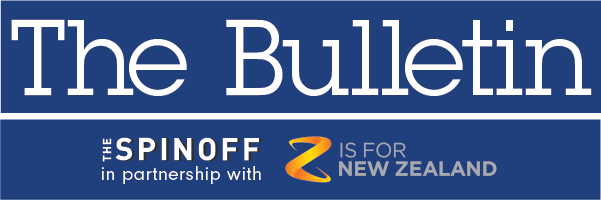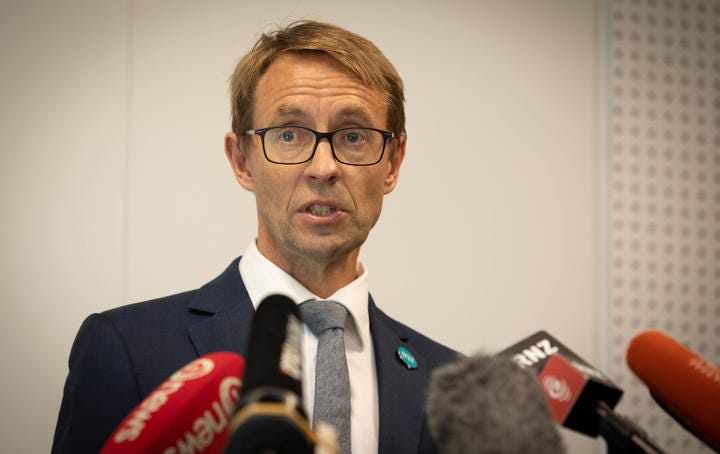
Good morning and welcome to The Bulletin for Wednesday 11 March, by Alex Braae for The Spinoff. Presented in partnership with Z Energy.
In today’s edition: Lab test worker strike criticised and defended, business confidence slumps, and Porirua emergency housing motel proves controversial.

There has been controversy over a strike by laboratory workers this Friday, amid the wider Covid-19 outbreak. Newshub reports that the strike has been planned long in advance – since November last year in fact, well before the coronavirus was any significant concern. The APEX union has also reassured the public that Covid testing won't be interrupted by the strike, which will take place at two of the three labs currently doing testing.
It probably won't come as a massive surprise that the decision to continue with the strike went down extremely badly on talkback station Newstalk ZB. Station promos running during the broadcast included morning host Kerre McIvor describing it as "almost treasonable", and Kate Hawkesby was apoplectic in her morning editorial. There was clearly more widespread concern though, with PM Jacinda Ardern saying "still within the current environment that we're in, my instinct is that most public health workers will be very mindful of the situation … and will be wanting to pull together as much as we can," when she was asked about it at the post-cabinet press conference on Monday.
The Medical Director of Health Dr Ashley Bloomfield said both the ministry and the union were looking to find a solution. But as the NZ Herald reports, he also made his strong displeasure at the situation clear, both in public and to the union. The union says they have long been underpaid, and say that what is being offered would lock their members in to inferior contracts. Without wanting to get too amateur-mediator about it all, it's very possible they're both right, in that the grievances are real, and that the timing is difficult.
There has been controversy over a strike by laboratory workers this Friday, amid the wider Covid-19 outbreak. Newshub reports that the strike has been planned long in advance – since November last year in fact, well before the coronavirus was any significant concern. The APEX union has also reassured the public that Covid testing won't be interrupted by the strike, which will take place at two of the three labs currently doing testing.
It probably won't come as a massive surprise that the decision to continue with the strike went down extremely badly on talkback station Newstalk ZB. Station promos running during the broadcast included morning host Kerre McIvor describing it as "almost treasonable", and Kate Hawkesby was apoplectic in her morning editorial. There was clearly more widespread concern though, with PM Jacinda Ardern saying "still within the current environment that we're in, my instinct is that most public health workers will be very mindful of the situation … and will be wanting to pull together as much as we can," when she was asked about it at the post-cabinet press conference on Monday.
The Medical Director of Health Dr Ashley Bloomfield said both the ministry and the union were looking to find a solution. But as the NZ Herald reports, he also made his strong displeasure at the situation clear, both in public and to the union. The union says they have long been underpaid, and say that what is being offered would lock their members in to inferior contracts. Without wanting to get too amateur-mediator about it all, it's very possible they're both right, in that the grievances are real, and that the timing is difficult.
For once this measurement seems closely directly correlated with existing economic conditions. Radio NZ reports business confidence has plummeted to levels not seen since 2009, according to the ANZ survey. The chief cause of the sharp drop is the Covid-19 outbreak, and retailers especially are concerned. That area was already facing some challenges around soft spending, so any further drop will be a real worry. Interest also reports that the Reserve Bank governor Adrian Orr has put the onus on fiscal policy, rather than monetary policy, to lead the charge. There may still be an interest rate cut later this month, but expectations are being tempered.
And an update on self-isolation numbers: the NZ Herald reports that almost 9000 households have now self-isolated, with almost 6000 of those periods now at an end. Included of the numbers of those who are almost ready to go back to work are staff from North Shore hospital.
Porirua has acute and serious housing issues, particularly for those on low incomes or benefits. But the purchase of a Plimmerton motel for emergency housing has rankled with nearby residents, reports Stuff. The residents who were concerned went unnamed, but noted points like the high decile rating of the area, and not being aware it would happen when they bought property. Kāinga Ora is expected to start placing residents around the middle of the year, with 17 units in the motel that can be used.
The Gliding community has been hit with the insolvency of the one commercial operator, reports Anan Zaki for Radio NZ. Glide Omarama was told by the CAA that it needed to re-certify and re-license all pilots, which would come with a cost too great for the firm to bear. They in turn say they've called for regulation changes to be made for years, to be more appropriate for their type of flying machine. 21 jobs are being lost.
Vaping companies have invested heavily in advertising at music festivals over the summer, reports Larissa Howie for Te Waha Nui. It came ahead of draft legislation that would have banned such promotion, and AUT marketing senior lecturer Sommer Kapitan said it would have been an attempt to drive brand loyalty among younger users. A British-American Tobacco spokesperson quoted in the story notes that they encourage all smokers to switch to vaping as a healthier alternative – but it's not like they're going to turn new customers down if non-smokers decide to vape.
Got some feedback about The Bulletin, or anything in the news?
Drop us a line at thebulletin@thespinoff.co.nz

Right now on The Spinoff: Fiona Hutton urges all sides to use accurate information in the upcoming debate about the cannabis referendum. Neil Miller writes about writing the conservation policy for Sustainable NZ, and his fear that it won't really go anywhere.Josie Adams gets the stories of two volunteering organisations who say what they do isn't voluntourism.Toby Manhire compares Covid-19 airport screening in NZ with other countries.Alex Casey continues her oddysey through the oddness of The Bachelorette. And Madeleine Chapman gives her guide to the best and worst of the 'change range' – i.e, extremely cheap fast food.
For a feature today, a piece about the moment of reckoning in which we had to face up to the destructive power of Whakaari/White Island. NZ Geographic's Geoff Chapple has gone back into the history of how the volcano had been visited, and how the attitudes built up over decades contributed to the tragedy when it erupted last year. And it gives a forensic account of the events on the day, in a way that shows how difficult the snap decisions that had to be made were. Here's an excerpt:
In 2017, the Taits sold their business, White Island Tours—a 27-year-old enterprise that came with a motel and café—to Ngāti Awa Group Holdings, who kept on many of the Taits’ employees.
“Safety?” says Tait, when asked about the potential risks of taking visitors to an active volcano. “We were more worried about the Whakatāne River bar than the island erupting, to be honest. There were so many things. It was an adventure trip. You have to cross the river bar. You have to cross pretty rough ocean, then get into an inflatable and land, with very tricky conditions to get onto the island at times. And you’re on the island a very short time, really. The overall chances of it erupting seemed pretty small.”
That's it for The Bulletin. If you want to support the work we do at The Spinoff, please check out our membership programme.




